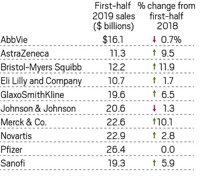Advertisement
Grab your lab coat. Let's get started
Welcome!
Welcome!
Create an account below to get 6 C&EN articles per month, receive newsletters and more - all free.
It seems this is your first time logging in online. Please enter the following information to continue.
As an ACS member you automatically get access to this site. All we need is few more details to create your reading experience.
Not you? Sign in with a different account.
Not you? Sign in with a different account.
ERROR 1
ERROR 1
ERROR 2
ERROR 2
ERROR 2
ERROR 2
ERROR 2
Password and Confirm password must match.
If you have an ACS member number, please enter it here so we can link this account to your membership. (optional)
ERROR 2
ACS values your privacy. By submitting your information, you are gaining access to C&EN and subscribing to our weekly newsletter. We use the information you provide to make your reading experience better, and we will never sell your data to third party members.
Business
Merck To Acquire Partner Schering-Plough
The $41 billion deal is aimed at diversifying and stabilizing Merck's portfolio
by Lisa M. Jarvis
March 9, 2009
Merck & Co. has agreed to pay $41 billion for fellow New Jersey-based drug firm Schering-Plough. The deal, expected to close in the fourth quarter, will create a pharmaceutical behemoth that would have had sales of $46.9 billion last year.
The planned purchase is a major change of course for Merck, which long maintained that its own science-driven culture was sufficient to create strong sales growth. But earlier this year, Merck CEO Richard T. Clark told investors that, in the current challenging climate, the company could no longer rule out acquisitions of scale.
As Fred Hassan, Schering-Plough's CEO, put it in a conference call with investors this morning, the new company will have "a critical mass to absorb the bigger and bigger shocks" reverberating through the drug industry on a regular basis.
In acquiring Schering-Plough, Merck is building on a relationship that began in 2000 with a joint venture to develop cholesterol-lowering drugs. Blazing sales of the two resulting drugs, Vytorin and Zetia, helped each company to recover from setbacks in the early part of the decade. But growing questions over the drugs' efficacy have led to a steady decline in sales. Add generic competition to other key drugs and an increasingly challenging operating environment, and Merck finally decided to look beyond its own laboratories for growth.
The deal is the latest in a drug industry buying spree. Earlier this year, Pfizer agreed to fork over $68 billion for Wyeth, while last week Roche raised its bid for full control of Genentech.
Merck's reasons for the deal are strikingly familiar to those offered by Pfizer in its bid for Wyeth: to diversify its portfolio, bolster its position in emerging markets, and increase its ability to discover and develop biopharmaceuticals.
"One of our key strategic objectives is to have more stable, consistent top-line growth," Clark said this morning. The combination will diversify Merck's revenues, with no one product accounting for more than 10% of sales—a claim also made by Pfizer. Clark noted that Schering-Plough's lead products have a lot of time left on the patent clock. Further, the addition of Schering-Plough's pipeline will double the number of drugs in Phase III trials at Merck to 18.
The deal also bolsters Merck's presence in biopharmaceuticals, an area the company has targeted for growth. Last year, Merck created a BioVentures unit dedicated to developing follow-on versions of currently marketed biotherapeutics. Schering-Plough expands that effort through its Organon Biosciences unit, which it acquired from AkzoNobel in 2007 for $14 billion.
The companies also believe they can save money through consolidation. Both firms have existing cost-cutting programs—Merck initiated a $1 billion program late last year, while Schering-Plough is in the midst a $1.5 billion savings plan—but they believe they can carve out an additional $3.5 billion in savings by 2011.







Join the conversation
Contact the reporter
Submit a Letter to the Editor for publication
Engage with us on Twitter